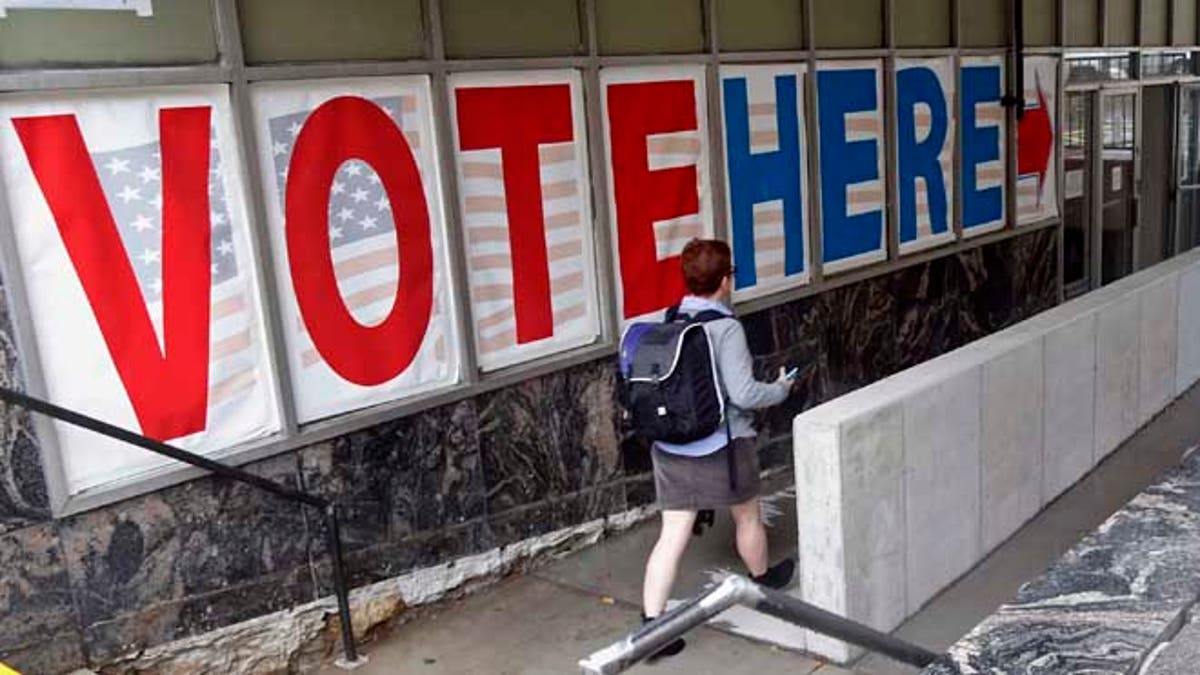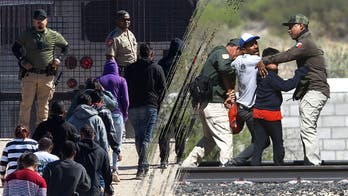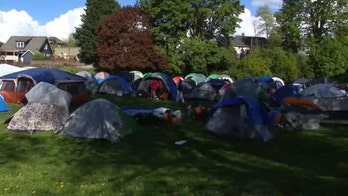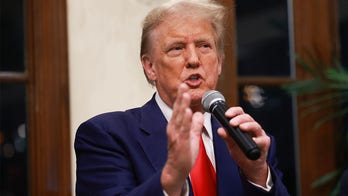
FILE - In this Sept. 23, 2016 file photo, a voter woman passes a large sign before voting in Minneapolis. If Donald Trump or Hillary Clinton scores a high note or commits a blunder in Sunday's presidential debate, millions of voters can respond almost immediately. They can fill out a mail-in ballot right away, or head to a polling location the next day. (AP Photo/Jim Mone, File) (Copyright 2016 The Associated Press. All rights reserved.)
While Latinos have participated in early voting at a high rate, helping to give Hillary Clinton an edge over Donald Trump, what they do on Election Day could help determine not just who wins the presidency, but how the community will be treated for years, experts say.
Citing polls of Latino likely voters and early voting turnout, Latinos are said to be turning out in record numbers in many key areas in battleground states, such as Florida, and are projected to give Clinton a higher level of support than even President Barack Obama got in 2012, when he clinched 71 percent of the electorate’s support.
But experts say Hispanics have to continue their momentum on Election Day to make a significant impact.
“The only way we will not be punching bags in future elections is to vote,” said Jose Fernandez, a lawyer and Clinton supporter who has written essays on Latino voters. “If candidates see it will cost them to insult Latinos” they will be less inclined to do so.
Many Republicans have expressed concern that with Trump as the party standard bearer, the GOP has undone any gains it made among Latinos since the bruising defeat in 2012 of the party’s presidential nominee, Mitt Romney.
Some Latinos have expressed outrage over Trump’s focus on building a wall along the U.S.-Mexico wall, his remarks about Mexico sending over drug dealers and other criminals, and his assertion that U.S. District Judge Gonzalo Curiel — the judge overseeing the Trump University fraud case — is incapable of being objective because of his “Mexican heritage.”
The anger over his comments, experts say, is mobilizing the entire community.
“The story of this election may be the mobilization of the Hispanic vote,” said Senator Lindsey Graham, a South Carolina Republican who has been a vocal critic of Trump, to The New York Times. “So Trump deserves the award for Hispanic turnout. He did more to get them out than any Democrat has ever done.”
“If we don’t come to grips with the demographic challenges we have with Hispanics in presidential politics,” Graham said, “we’ll never right the ship.”
The same can be said of Latinos, experts say, and the enduring impact of whether or not they turn out in significant numbers on Tuesday.
Some 27 million Latinos are eligible to vote, and an estimated 16 million registered to do so, according to an analysis by the National Association of Latino Elected and Appointed Officials, or NALEO.
Of those, NALEO projects that roughly 13 million will have casted their ballots by Election Day.
In several countries of Latin America, and in Puerto Rico, voter turnout has often exceeded 80 percent. But once here, participation in elections by people from those nations and Puerto Rico falls precipitously.
Daniel Garza, executive director of the Libre Initiative, a conservative group that seeks to get more Latinos involved in the political process, said that while in Puerto Rico, 80 percent of the resident turn out for elections, on the U.S. mainland, “Puerto Ricans are down to 40 or 45 percent” turnout.
“When people don’t have a sense of ownership in something, they’re not committed.”
But Latinos have stepped up to the plate in a fervent way when they are energized.
Former President George W. Bush got 44 percent of the Latino vote in 2004. In California, former Governor Pete Wilson’s hardline approach to immigration and support for strict measures denying undocumented immigrants services helped create such a strong Latino political movement there that it’s been nearly impossible for Republicans to win elections in the state.
“If Latinos don’t vote, their voice or their ability to influence policy is diminished,” Garza said.
Garza said he is disappointed that the Republican Party, which has conservative values that he most closely shares, has not done more to connect with Latinos.
Efforts by Libre and other GOP Latino groups could not counterbalance the negative image many Latinos have of Trump or the party, Garza said.
“The left has been the one that has recognized the importance of the Hispanic vote,” he said. “The result is there’s very much a one-sided conversation in the Latino community on policy and politics.”
Garza believes that the Latino turnout will be huge this time, in great part because of assertive efforts by Spanish-language media to urge people to register to vote and show up at the polls.
“If we turn out in record numbers,” he said, “we become much more influential in defining races and candidates will invest more in us in mid-term and presidential elections.”




